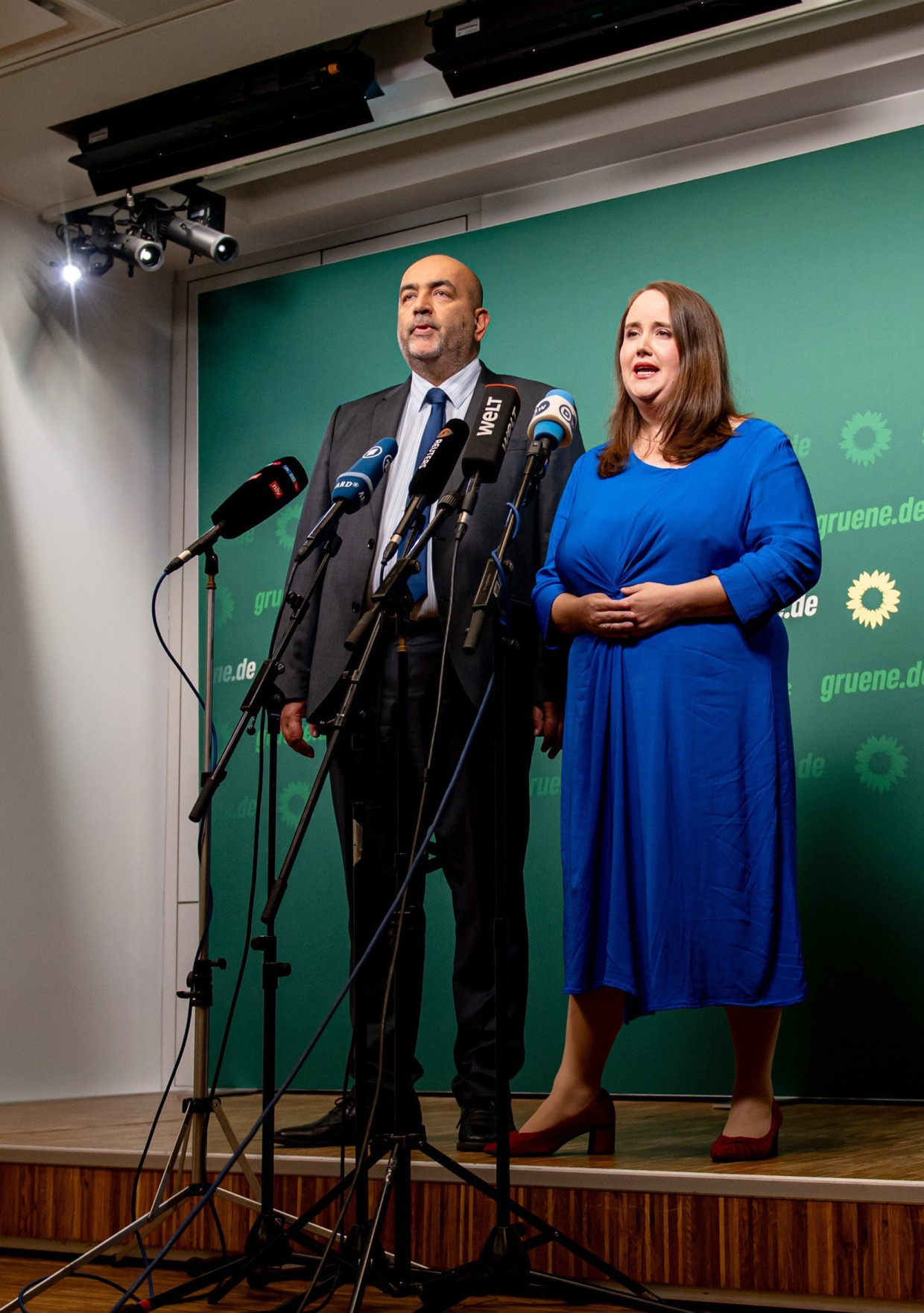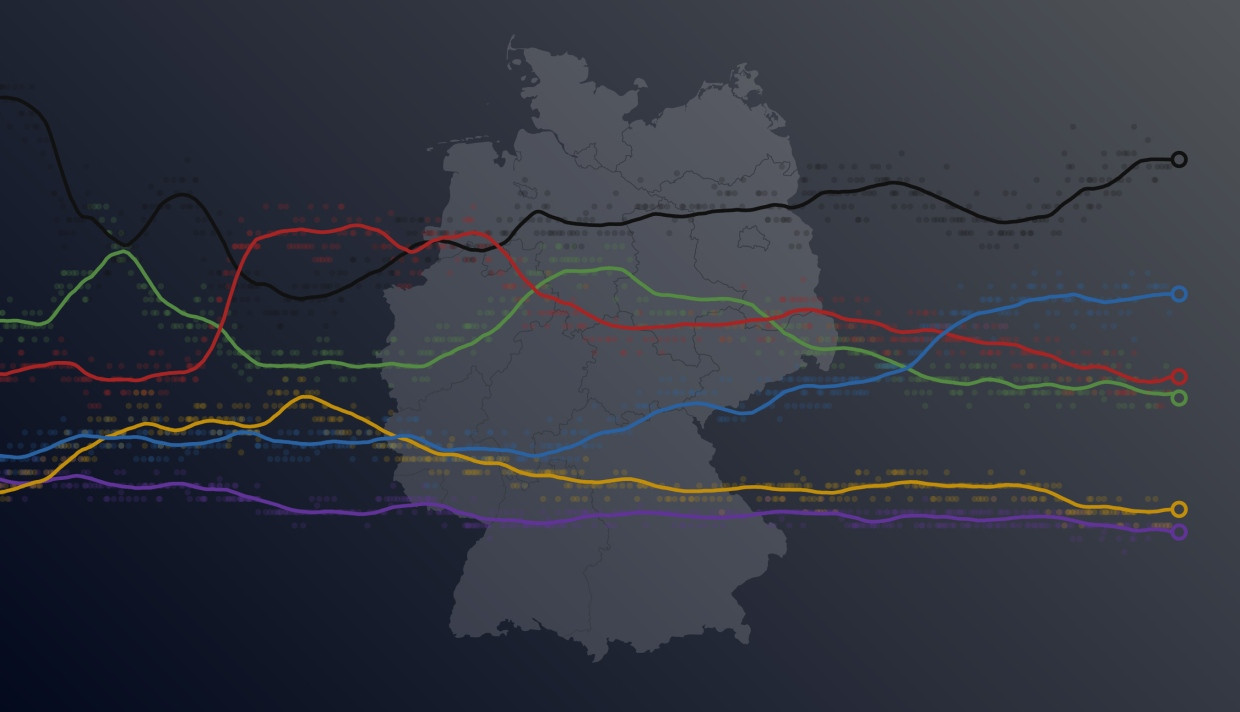Nach fünf Monaten voller Niederlagen und einem dramatischen Niedergang in den Umfragen hat die Führung der Grünen sich zum Rücktritt entschlossen. Omid Nouripour und Ricarda Lang, erst vor zweieinhalb Jahren unter Jubelstürmen von den Grünen-Delegierten in die Ämter gewählt, erklärten am Mittwoch ihren Rücktritt. Und mit ihnen verlieren die Grünen auch die Funktionsspitzen aus Geschäftsführung und Schatzmeisterei, sowie zwei weithin unbekannten Stellvertreter. Die Partei sei, so erklärte Nouripour in einer kurzfristig anberaumten Pressekonferenz, „in der tiefsten Krise seit einer Dekade“. Es sei notwendig und möglich, diese Krise zu überwinden, glaubt Nouripour.
Das glauben aber wohl vor allem diejenigen, die zu einer Neuaufstellung gedrängt haben, vor allem wohl derjenige, von dem vermutet wird, eine treibende Kraft zu sein: Robert Habeck, Wirtschaftsminister und informeller Kanzler- oder Spitzenkandidat der Grünen für die nächste Bundestagswahl.
Man habe nach der Landtagswahl in Brandenburg „intensiv darüber beraten, welche Veränderungen es braucht und wir sind zu dem Ergebnis gekommen, dass es einen Neustart braucht“, sagte Nouripour vor der Presse. Lang und Nouripour hatten die Parteiführung nach der Bundestagswahl 2021 von Annalena Baerbock und Habeck übernommen. Habeck lobte den Rücktritt der beiden, der Schritt zeuge von „großer Stärke und Weitsicht“. Beide machten den „Weg frei für einen kraftvollen Neuanfang“, sagte er. „Das ist nicht selbstverständlich, es ist ein großer Dienst an der Partei.“ Aber wie kam es zu diesem großen Dienst?
Am Mittwoch gingen die Erzählungen dazu bei den Grünen durcheinander, widersprachen sich manchmal, eingeweiht waren außerhalb des Parteivorstands selbst ohnehin nur wenige – vor allem waren es die Mitglieder des eigentlichen Machtzentrums der Partei, der Sechser-Runde. Neben den beiden Vorsitzenden sind das die beiden Fraktionsvorsitzenden, die Außenministerin Baerbock und Habeck.
Nouripour sah Ende seiner Möglichkeiten erreicht
Am Anfang der Erzählung stehen die Zahlen der vergangenen Monate: Bei der Europawahl im Juni stürzte die Partei um neun Prozentpunkte auf 11,8 Prozent ab. In Thüringen erhielt sie 3,2 Prozent und flog aus dem Landtag. In Sachsen liefen den Grünen die Wähler davon, die Partei bliebt nur knapp im Landtag. Und dann kam die Brandenburg-Wahl: eine Niederlage auf ganzer Linie, raus aus der Landesregierung, raus aus dem Landtag. Was die Grünen unterscheide, heißt es aus der Partei: Dort habe man noch die Kraft und das Personal Konsequenzen zu ziehen. Anders als SPD und FDP, die ähnlich schwere oder noch schwerere Niederlagen erlitten hatten. Dass Bundeskanzler Olaf Scholz sich am Mittwoch geradezu beeilte mitzuteilen, das alles habe nichts mit der Regierungskoalition zu tun, sprach für sich.

For Nouripour at least, the Brandenburg election seemed to have put an end to his personal opportunities to put a positive spin on governing. “I wouldn't advise anyone to put too much emotion into this coalition,” he said on Monday in Berlin. The “established style” of the Berlin coalition politicians had damaged the election campaign. He continued: “The big Feng Shui moment will not come.” The work will continue, “but that's it.” He would “not necessarily set my heart on this constellation now.” So much pessimism seemed too much for Habeck in particular. How can you go into an election campaign like that? That's how pressure was built up.
Nouripour also felt this pressure in another round on Monday. According to participants' reports, there was a remarkable conference call of the Realos, of which he is a member. Around 300 participants from all regional associations were connected. The discussion also revolved around the analysis of the most recent election results in Brandenburg and the disastrous appearance of Federal Executive Director Emily Büning in the Berlin round on television, which almost all participants considered disastrous. There, Büning had portrayed all of the problems of the traffic light government as nothing more than a communication problem. Büning belongs to the camp of the party's left wing, and was never popular with the Realos. She is accused of not having focused the election campaign in Brandenburg on the Potsdam constituency, which, according to the electoral law there, would have enabled them to enter the state parliament by direct mandate. Lang was also criticized a lot; many felt that her commentary on the election defeat was too self-righteous and lacked humility.
Names for the successor are already circulating
In the discussion, moderated by Heiko Knopf, one of the two largely unknown deputy party leaders, it was said that Habeck and Baerbock must now be put forward. To the surprise of some participants, unequivocal calls for the resignation of the entire federal executive board were then made. There were around 30 requests to speak in the discussion, ten to twelve suggested a new beginning, five to six were very clear. Franziska Brantner is also said to have taken part in the call. She is Parliamentary State Secretary in Habeck's ministry, she was to be appointed as his campaign manager – and after the federal executive board resigned, her name was immediately circulating on Wednesday as a successor at the top of the party.

According to participants, Brantner did not initially comment on personnel issues, but she is said to have repeatedly commented on substantive issues. Especially since the Greens' crisis in the traffic light government has worsened, the party says, the former MEP has developed into a kind of “spiritual animal” of the party – the beacon of hope for the younger realists.
At the end of the extensive discussion, Nouripour is said to have given an outlook on the coming weeks: He made statements on the reorganization of the federal office, the problems with the FDP and the budget dispute. At the end, he is said to have responded to the calls for his resignation: He had already asked himself what responsibility he had for the defeats. If “someone wanted to get rid of Omid,” he could only answer that with Lang he still had the “strength to carry on.” The participants got the impression that the chairman was not prepared to clear the way.
Habeck should be relieved
After the Realo meeting on Monday, there were supposedly confidential talks between Habeck and the two party leaders. Brantner was also said to have been involved. According to information from the FAZ, Habeck made it clear internally that he needed the best possible line-up for the election campaign. This is a matter of course, but it is causing some members of the left wing to get their hearts racing. Those around Habeck reject this interpretation of pressure. Instead, they point to an independent decision by the two leaders that deserves respect.
What is certain is that Nouripour and Lang had many discussions on Tuesday, often in private. When the decision was made, they discussed it with the federal executive board and then called the members of the six-party group individually. Baerbock was already at the United Nations in New York. In recent weeks, she and Habeck have grown much closer together again after the tensions of the past period, including in the preparation of the election campaign. On Wednesday, she said that Nouripour and Lang's decision “deserves infinite respect.”
With the change in the party leadership, the Greens are not only making the election campaign easier for the likely top candidate, they are also avoiding a highly emotional debate about direction at the federal party conference in Wiesbaden in mid-November. Numerous motions from the party base had already led to a debate following the Greens' tried and tested crisis management model: We can only survive if we are noticeably left-wing. A theory that usually sends the realists into a panic.
Habeck takes risks at the party conference
Nouripour summed up these debates by saying that it was “time to put the fortunes of this great party into new hands”. Lang explained that “new faces are needed to lead the party out of the crisis”. Now is “not the time to cling to chairs”. The personnel reshuffle should be “a building block for the strategic reshuffle of the party” in order to survive the upcoming federal election. What this could mean remains a mystery for now. Lang and Nouripour, like the other four members of the Green Party's federal executive board, declared that they would continue to do their work in an acting capacity until the executive board elections in November. How this is to work does not seem to have been agreed upon either. Will Lang and Nouripour still play a role in the budget negotiations, and will they even be involved in coalition talks?
In addition to the name of Brantner as representative of the realo wing, the other candidate for the chairmanship was Felix Banaszak as representative of the Left. The 45-year-old political scientist Brantner is considered ambitious and has a sense of mission. And she also seems to have Habeck's trust. The 34-year-old Banaszak comes from North Rhine-Westphalia, he was once at the head of the Green Youth and once successfully led the state association – together with Mona Neubaur, who is considered a close confidante of Habeck. However, other names were circulating on Wednesday, and above all the assessment from the party: Nothing has been decided yet. The election will take place at the party conference in Wiesbaden.
At this party conference, however, Habeck himself also wants to take a risk – and get the party behind him and his candidacy. On Wednesday, he said that the election defeats were “undeniably influenced by the federal trend.” And: “We all bear responsibility here, including me.” He wants to face up to this and at the party conference “an open debate on a possible candidacy and an honest vote in a secret ballot.” Baerbock sent him her full support from New York: “I will support him on his path and at the upcoming party conference with all my strength and commitment,” she said. “Together, and only together, can we Greens be a strong voice in Germany and for Germany in Europe and the world.”
Habeck made it clear who is now in charge: “The party conference in November will now be the place where the Greens will regroup and reposition themselves in order to then begin the race to catch up for the federal election with renewed vigor.” Polls put the Greens at only ten to eleven percent.









